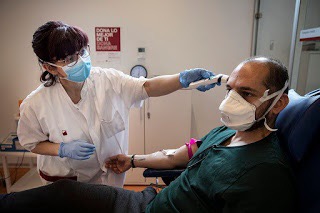Perverse Normality
- Adrian Lapadat

- Feb 6, 2021
- 5 min read
Americans are disempowered; we’re doing our best to cope with the new normal. Almost a year into the pandemic, our lives are completely ruled by COVID, and there’s no end in sight.
Do we fully grasp the crisis? As University of Virginia psychology professor Dennis Proffitt puts it, “in the face of uncertainty, we are biased to perceive the world as we would like it to be.”
Caption: A nurse takes a patient’s temperature. Photo by Jordi Play.
This issue isn’t uniquely American. But as Americans, we must have the courage to face the world not as we wish it to be, but as it is. If you can, volunteer or donate to food banks, clothing banks, and other charities. The needs of the American public are not being met. Call or write your representative.
Enough is enough.
No comparable nation has our case numbers. Our medical system is uniquely flawed. The former president’s Republican administration had no plan for the Coronavirus until it was too late. Meanwhile, Republican opposition vehemently fought even milquetoast Democratic proposals. Now that the Democrats are in power, they have failed to make good on their promise of $2,000 stimulus checks. Today, the debate as to whether Americans deserve $500 billion to feed themselves rages on. Back in April, there was much less debate about whether corporations deserved $500 billion in tax rebates.
So what does mental illness have to do with politics? Politics sets the stage for how we deal with mental illness. The US has some of the highest rates of emotional distress. Shockingly, 45% of Americans experienced emotional distress because they couldn’t feed themselves, worried about being evicted, or had to navigate drugs/criminal activity. One in eight Americans struggle with mental illness because they don’t have enough money. And one in six of those Americans can’t afford mental healthcare. In the world’s richest nation, these statistics look really bad. They look even worse when you realize they’re from 2016. That’s before Trump-era regulations slashed funding for mental health. That’s the same administration that had $500 billion lying around for corporations.
Millions are at risk of eviction, thousands die every day from Coronavirus, and new strains imperil even more lives against a medical system that could not withstand the first wave of Coronavirus back in April.
Meanwhile, ads cheerily push delivery services, and companies are moving product like never before. In the last year alone, Amazon and Walmart recorded record-breaking profits. They made so much money, they could have paid their employees four times more in hazard pay, and still made a profit. They chose not to.

Caption: An Amazon Air jet, part of the company’s expansion into air delivery. Photo by Matti Blume.
The number of confirmed deaths at Amazon is surprisingly low. The only reporting I can find this year dates back to May, when the LA times reported 1,000 cases and 8 deaths. In October, Amazon admitted that 19,816 of the people making their profit—their workers—had tested positive for Coronavirus. The average mortality rate for Coronavirus in the United States is 1.7%. That means, if there are 19,816 cases, we should expect 336 deaths. Amazon has remained silent about their death toll since May. Because case numbers have surged since October, it is quite likely that at least 1,000 Americans have died in the line of fire and in the name of corporate expansion. That’s just at Amazon.
The amount of suffering and devastation is beyond reckoning. First, there is the incomprehensible suffering of 400,000 human beings snuffed out from the beauty of life. Then, every single person that loved the deceased remains. Children without mothers, widows in tears at the loss of their husbands, sons losing their guiding lights: their mothers and their fathers. Every story, every single death, carries with it the weight of someone’s world. Through the pain, many will carry on.
But from the anguish, that black cloud: cold, it grips at their lungs and chests, weighing them down into their beds at morning, crippling their souls. These people still have bills to pay, things to study for, work to be done. How can they find it in them?
You need extraordinary willpower to fight against these things, and it’s ok to not succeed. So if a poor, mentally-ill person is too depressed to show up to work, or can’t focus because of PTSD or OCD, then what? They certainly can’t afford therapy, prescription drugs, or maybe even food. There are mile-long lines outside of food banks right now, because that’s how little money people have. In the richest country in the world, people are starving. People are choosing between feeding themselves or their children. In the richest country in the world, we cannot help people get back on their feet after a loved one’s death.
Caption: “depression”, by artist darkwood67.
Even if the pandemic spared their loved ones, the “new normal” hit Americans hard. Quarantine breaks off social relationships and reduces opportunities for social interaction. Masks make that even harder. Online interactions become tiring, and despite all our technology, many people grow isolated. Isolation is correlated to mental illness, and sure enough, the rate of mental illness has gone up in the U.S. Specifically, the case numbers for Depression, Obsessive-Compulsive Disorder (OCD), Post-Traumatic Stress Disorder (PTSD), and Post-Traumatic Stress Syndrome (PTSS) have greatly increased.
Beyond the price tag, one of the hardest things mentally-ill people face is feeling they can’t ask for help: inertia. Inertia is toxic; people don’t want to admit they have a problem. In less than a year, more dead than WWII. A recession in full effect, with unemployment on the rise. But when they look around, what do they see? Cheery ads, selling them toothpaste, online services, whatever. It’s almost like the pandemic never happened, if a company wants to sell you something. In every facet of American life, people go on like this new normal was our normal from before. It’s not normal. Millions of people are suffering in America. We can’t put on a professional face and pretend it’s business as usual.
BONUS: Schedule Update
Around two weeks ago, I wrote a little bit about time management. It’s probably one of the most important skills to have, especially in the Zoom age.
Since then, I made the flight back to Pittsburgh to resume my Sophomore year of college.
Let me start off with some of my failures. Sometimes, I don’t have the willpower to follow up on my plans. Setting deadlines to work across multiple days would be a good call for consistency there. But often, I find myself too overwhelmed to even do that, even though I know it works. It’s a matter of getting it into my system, but right now it’s kind of like a transplant my body is rejecting, if that makes sense.
Here’s a success, mostly on the calendar side. When is the FAFSA deadline? I’ve consistently barely missed it for 3 years. And you want to know something I didn’t know? For some genius reason, my University, Carnegie-Mellon, has their deadline on the 16th of February. You wanna know when the federal FAFSA deadline is? June 30th. When it comes to consistency, having the federal and school deadline be literal miles apart is supremely unhelpful. Thank God I wrote it down on my calendar. To make things easier for you, there’s also a deadline.
Anyway, if you’re a college student, buckle up. I hope this semester isn’t going to suck as much as the last one. Take some time to schedule and try not to abuse yourself too hard to make those grades meet. It’s going to be tough, so don’t forget to keep in touch with your friends and loved ones. Sometimes it’s really hard to understand why we’re going through all this, but at the end of the day you’re going to leave this semester smarter and more prepared, no matter what misgivings you have. Pay attention to what you want, and to what your mental illness wants. It’s going to be okay.
Adrian
.png)








Comments